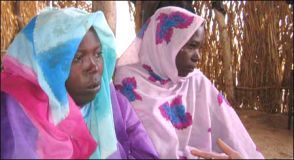Darfuris demand action after women raped
By Opheera McDoom
ZAM ZAM CAMP, Sudan, May 7 (Reuters) – Darfuri Sumaya Hassan Mohamed was kidnapped, beaten, raped and then given money to go and buy soap to wash the blood off herself.

|
|
These Darfur refugee women are among many who have described how they were attacked and raped in their villages by roving gangs of Sudanese men. (Alertnet). |
This pattern is repeating itself in many of the camps in Sudan’s Darfur region which house the more than 2 million people driven from their homes by more than two years of open revolt in the remote area.
Eighteen-year-old Mohamed hid her face in shame. Her brown eyes looked pained as she pulled a floral cloth across her face.
“I’ve lost my future now. No man will come to marry me,” she said looking at the floor and shifting uncomfortably on her bed in the tiny straw hut which is now her home.
She fled a government attack on her town on Thabit more than a year ago and now lives in the patchwork of plastic covered shelters that is Zam Zam displaced camp, southeast of the capital of North Darfur state El-Fasher.
Mohamed said three soldiers from a nearby camp surrounded her, a friend Mariam Ismail Suleiman and five young children as they were fetching firewood a few km away from the camp. They sent the children away and she became paralysed with fear.
One of the soldiers, from the Dinka tribe in southern Sudan, told the other two not to harm the women. They refused and he left.
The women were forced into straw huts by the remaining two soldiers who raped them. Mohamed said the soldiers wore the traditional uniform of the Sudanese army.
SCREAMS
“He grabbed me by my hands and said ‘now I’m going to make you a woman’,” Mohamed said. “I screamed ‘I don’t want to become a woman’, but he wouldn’t listen,” she said.
Then he threw her onto the floor on her back and raped her, she said. The attack happened last Tuesday.
Rape is a taboo subject in Sudan’s traditional Muslim society, and it is often shameful for a woman to admit they have been raped.
Mohamed said African Union forces, who are monitoring a shaky ceasefire in the region, made a report about the attacks. Both women were given anti-retroviral drugs in the camp hospital to protect them from HIV/AIDS.
Both women and their families said they felt helpless and frustrated because they could not stop the attacks which happened regularly. They were upset at the African Union for not doing more.
“If this happened once or twice since they arrived and then it stopped we’d think they were doing a good job. But they are here and it continues. It doesn’t stop,” said Musa Adam Ibrahim, a relative of Mohamed.
“What can we do, the African Union don’t follow up and the government do nothing so why go to the police?” he asked.
The AU does not have a peacekeeping mandate in Darfur, but monitors a ceasefire between rebels and the government and has some limited powers protect civilians.
The day after the rape, residents said the entire camp demonstrated, demanding that no government soldiers come into the camp.
